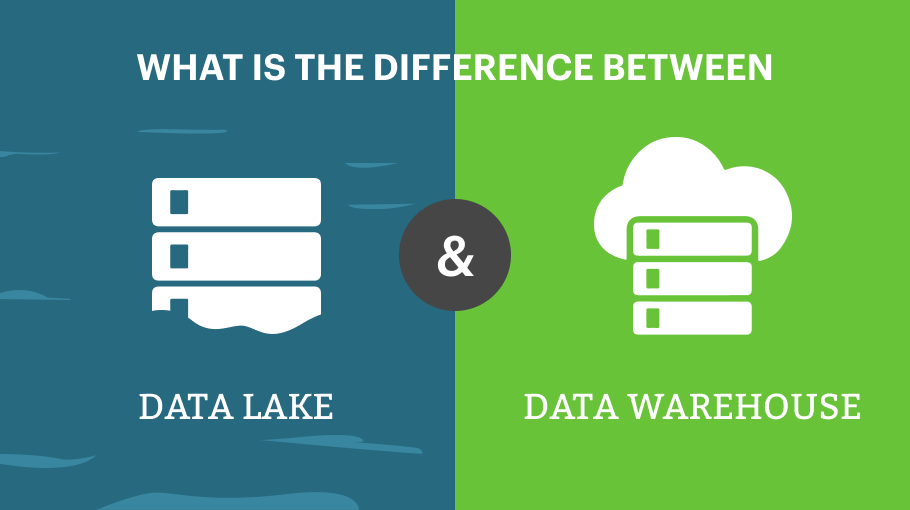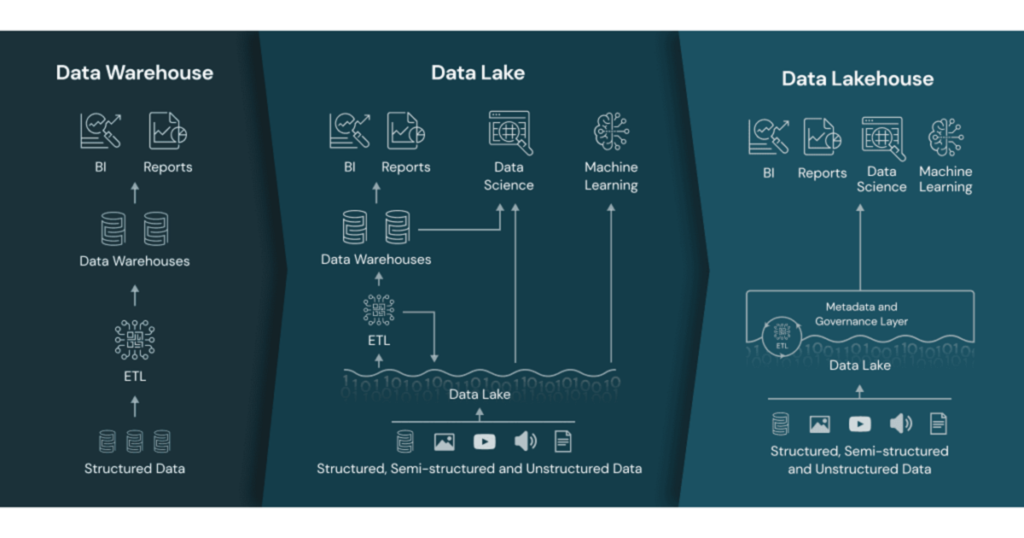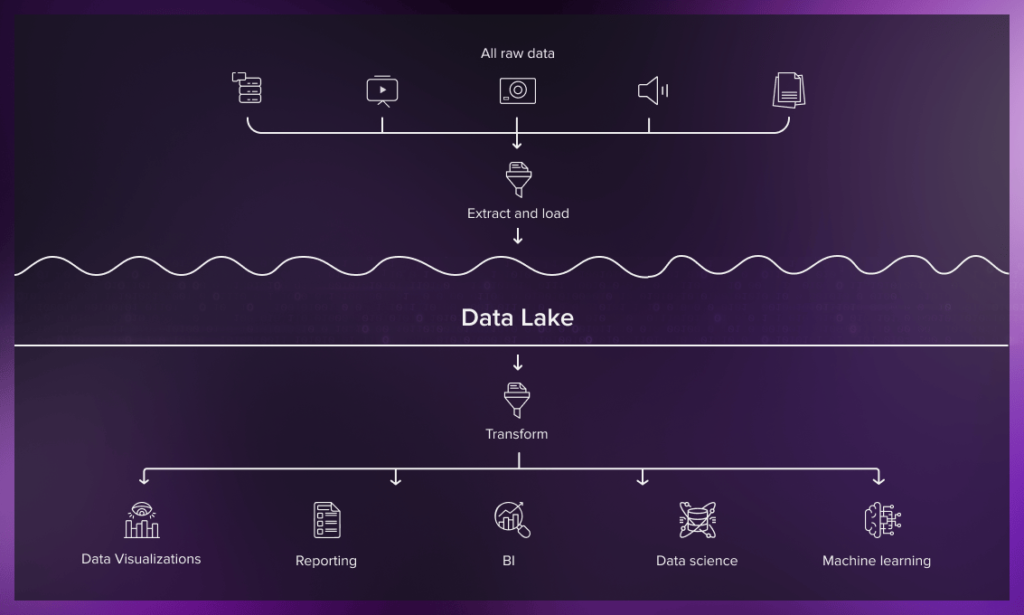
You know how it feels when you open your closet and it's just... chaotic? Shirts mixed with stockings, winter coats next to beach towels, and where on earth did you keep those expensive shoes? That's pretty much what's happening with business data these days.
We live in a world where our businesses act like data magnets, attracting information from all sides. It's amazing, but it can be a bit of a hassle. This is where proper data architecture including data storage and management solutions come into play.
Today, we'll talk about a major aspect of the data architecture game: Data Warehouse vs Data Lake or DW vs DL. If you've been scratching your head trying to figure out which one you need, let us help you sort it out!
What Are We Actually Talking About Here?
Before we go into the Data Warehouse vs Data Lake details, let's clarify what these terms signify.
Data Warehouse
In technical terms, a data warehouse is a centralized location where all structured, processed data from multiple sources comes to life. It's tidy, organized, and ready to go when you need to run reports or perform some heavy number crunching.
Data Lake
A data lake is a large place where you may dump any type of data - organized, semi-structured, or unstructured - in its raw form. It's huge and wild, but there's a lot of opportunity for those who want to explore.
Data Warehouse Vs Data Lake - What’s The Difference?
1. Data Structure
Starting with the Data Warehouse (DW), it:
- Uses a predefined schema (schema-on-write)
- Only stores structured data
- Everything has its place, like a well-organized library
When using a data warehouse, you must first determine how you want to arrange your data before storing it. It's excellent because everything is tidy, but it might be a little rigid if your requirements alter.
For example, suppose you run an e-commerce business. Your data warehouse may contain separate categories for customer data, sales data, and inventory data. It's really simple to generate reports on topics like 'total sales by region' or 'most popular products in each category'.
- DL (Data Lake), correspondingly Uses a schema-on-read approach
- Stores all types of data without a predefined structure
- More like a giant storage unit where you can toss in anything and sort it out later
The concept of data lakes revolves around flexibility. You do not need to decide how you will use the data before storing it. This can be quite handy if you're not sure what insights you'd like to gain from your data in the future.
Using our e-commerce example again, a data lake may have anything from structured sales data to unstructured customer evaluations, social media mentions, and even video footage from your warehouse. You don't have to know how you're going to use this information immediately. Maybe down the line, you'll want to study customer sentiment from reviews or use video footage to improve your packaging process.

2. Data Processing
In Data Warehouse;
- Information goes through ETL (Extract, Transform, Load) before storage
- All data is prepared before the analysis
Before being stored in a data warehouse, details go through a process known as ETL. Here is what that means:
- Extract: Pull data from various source systems.
- Transform: Clean it up, format it, and make it fit the predefined schema.
- Load: Finally, pop it into the data warehouse.
This procedure guarantees that all of the data in your warehouse is clean, consistent, and ready for use. Further, when you're ready to evaluate your data, everything is ready to go.
On the other hand, Data Lake;
- Uses ELT (Extract, Load, Transform) – raw data is stored first, then processed when needed
- More like keeping all data in their original form and deciding what to do with them later
3. Data Quality
- DW ensures high data quality through preprocessing and validation
- It's the neat freak of the data world
Data warehouses are all about quality control. Because data is processed before it's stored, you can implement strict data quality measures. This might include removing duplicate entries, correcting known errors, or standardizing formats.
- DL May contain raw, unverified data
- Requires additional governance measures
- It's more of a "come as you are" approach to data
Data lakes take a more relaxed approach to data quality – at least initially. The philosophy here is to store everything and deal with quality issues later when the data is actually used. This doesn't mean data lakes are a free-for-all, though. Further, good data lake management includes things like metadata tagging and implementing data governance policies.
4. Query Performance
- Data Warehouse is optimized for fast query performance and complex analytics
- Great for quick answers to business questions
When it comes to query performance, data warehouses are built for speed. They're designed to answer complex business questions quickly. This is possible because the data is preprocessed and organized in a way that optimizes query performance.
- In contrast, Data Lake's query performance can vary depending on data organization and processing methods
- Can handle more complex queries but might take longer
Data lakes value flexibility over speed. Query performance varies greatly depending on how the data is arranged and the tools used to handle it. Some queries, especially those involving machine learning on large datasets, can actually be faster in a data lake environment.
5. Scalability & Cost
- DW is less scalable and potentially more expensive for large data volumes
- Higher upfront costs but easier to maintain
Data warehouses can be similar to a luxurious condominium in an excellent location. They provide numerous benefits, but they come at a price. Initial setup expenses can be costly due to the requirement for meticulous planning and schema design. Scaling up to accommodate more data or users can also be expensive.
- DL is highly scalable and cost-effective for storing massive amounts of data
- Lower upfront costs but may require more specialized skills to maintain
In comparison, data lakes are similar to purchasing a large plot of land. The initial costs can be lower, and you have plenty of room to grow. Also, they can be developed using low-cost commodity hardware or cloud storage and are easily expandable to accommodate increasing data volumes.
6. Users & Use Cases
- Data Warehouse is Primarily used by business analysts and for operational reporting
- Perfect for the "show me the numbers" crowd
Data warehouses are the preferred choice for corporate customers who require dependable, consistent data for regular reporting and analysis. They're great for business analysts putting together monthly sales reports, executives searching for high-level performance measures, and finance teams reconciling data from many systems.
- Lastly, data lake is used by data scientists for advanced analytics, machine learning, and data exploration
- Ideal for the "What if we tried this?" people
Lastly, data lakes are particularly effective for advanced analytics and data science applications. They're ideal for data scientists running complicated machine learning algorithms, academics investigating enormous datasets for fresh insights, and innovation teams testing new ideas against historical data.

Data Warehouse Vs Data Lake | Side-by-Side Comparison
Alright, let's break it down in a convenient table for all of you visual learners out there:
Characteristic | Data Warehouse | Data Lake |
Type of Data | Structured | Structured, Semi-structured, Unstructured |
Schema | Schema-on-write (predefined) | Schema-on-read (flexible) |
Data Quality | Refined, preprocessed | Raw, requires governance |
Query Performance | Optimized for fast queries | Varies, can be optimized |
Scalability | Less scalable | Highly scalable |
Cost | Higher for large volumes | Lower for large volumes |
Users | Business Analysts, Executives | Data Scientists, Researchers |
Use Cases | BI, Reporting, KPI Tracking | Advanced Analytics, ML, Data Exploration |
Agility | Less Agile | More Agile |
When To Use Each?
Now, let's discuss when you would want to employ each of these data storage options. Remember, it's all about what works best for you.
Data Warehouse
Your Go-To for:
- Structured Data Analysis: If your data is nice, organized, and in a uniform format, a data warehouse is your best option. This is ideal for firms that primarily handle transactional data, such as sales figures, inventory levels, or financial records.
- Regular Reporting: Need to run the same reports week after week? A data warehouse can make your life easier. The established framework allows you to create automatic reports that operate like clockwork.
- Business Intelligence: A data warehouse can help you make informed business decisions by providing timely insights. The optimized query performance means you can get answers fast.
- When Data Consistency is Key: Additionally, if you can't afford data inconsistencies (think finance or compliance), a data warehouse is the way to go. The ETL process ensures that all data is cleaned and standardized before it is saved.
Data Lake
Your Best Choice for:
- Big Data: Got a ton of varied data and not sure what you want to do with it yet? Toss it in a data lake. This is ideal for organizations collecting vast amounts of diverse data and wanting to keep their options open.
- When Flexibility is Crucial: A data lake allows you to study your data in any way you can imagine. Also, it is ideal for firms that are always innovating and must react rapidly to new data applications.
- Machine Learning & Advanced Analytics: Data scientists appreciate data lakes' ability to store and process enormous amounts of heterogeneous data. If you want to get into advanced analytics or machine learning, a data lake can be the ideal option.
- IoT & Real-time Data Analysis: Are you dealing with a steady flood of unstructured data from Internet of Things (IoT) devices? A data lake can handle it. Also, it's best for firms that need to process and analyze data in real-time.
Why Not Both?
Many firms are adopting a hybrid approach, combining data lakes with data warehouses. This strategy allows them to:
- Store raw data in data lakes for future use and exploration
- Process and move relevant data to data warehouses for specific business needs
- Optimize costs by keeping large volumes in data lakes and refined data in warehouses
- Support both traditional BI and advanced analytics use cases
It combines the flexibility and cost-effectiveness of a data lake with the speed and dependability of a data warehouse, giving you the best of both worlds.
Bottom Line
So, there you have it, folks - a comprehension of Data Warehouse Vs Data Lake. The objective is the same whether you go with a data warehouse, a data lake, or a combination of the two – to make sense of your data and utilize it to advance your business.
After all, it's not just about having the most data – it's about making the most of the data you have.
Post a comment Cancel reply
Related Posts
The Strategic Impact of Data Architecture on Business Blueprints
Hey there, tech experts! Ever felt like drowning in a sea of data? Trust us,…
How to Build a New Comprehensive Data Operating Model
As technology continues to transform our lives, many companies have found new ways to analyze…
Two Ways To Calculate Sales Lift For Measuring Marketing Results
We are now in a golden age of digital marketing. Across all functions of a…
Seven Simple Ways To Keep Up With Massive Data Sets
Can anyone keep up with massive data sets? Business competition is increasing at unprecedented levels.…





